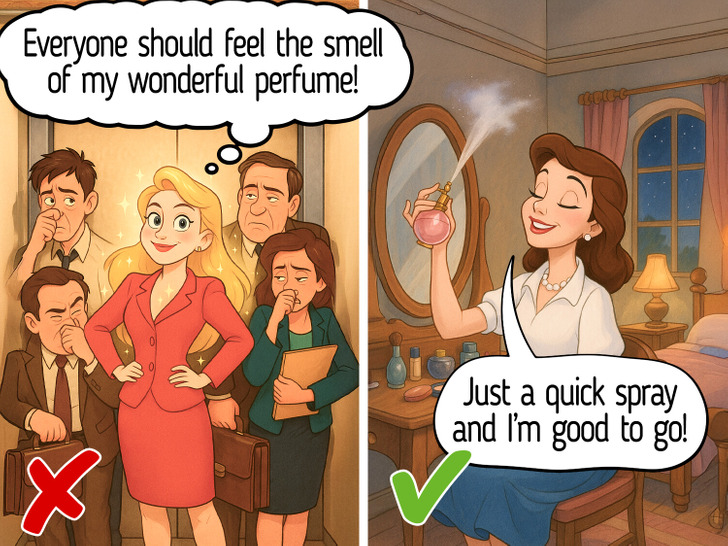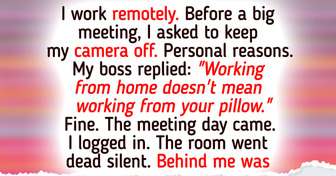7 “Helpful” Pieces of Advice That Might Be Actually Harmful


Good manners are like oxygen: they are only noticed when they are lacking. Etiquette may seem like something out of the long-forgotten past, but that’s only at first glance. Etiquette rules these days help you leave a good impression on a date, avoid judgmental glances on the subway, or build relationships with your hairdresser, neighbors, or potential employer.

Most people in seaside countries will never allow themselves to enter a café or shop in a swimsuit — it is a sure sign of a careless tourist. Even if you go to a seaside restaurant, you should wear a pareo or a sundress. This rule is especially relevant in countries with conservative culture — in some cities in Spain and Italy you can even get fined!
When a hairdresser washes your hair, closing your eyes is not just a gesture of politeness, but a way to create a comfortable atmosphere for both parties. Many hairdressers, as mentioned by The Sun, report feeling uncomfortable when a client stares at them intently during a treatment. This can be distracting and create unnecessary tension.
In addition, having your eyes closed helps you relax. Warm water and scalp massage feels good, and if you don’t get distracted by eye contact, you get more enjoyment. Little things like this make the service more enjoyable for everyone involved.
On a crowded train or bus, a backpack on your back is uncomfortable for everyone. You can’t feel its size and may accidentally push other passengers. Courtesy rules dictate that you take off your backpack and keep it in your hands or between your legs. In some cities, such as London, this rule is even written in the passenger guidelines.
Not everyone wants their photos to appear on the Internet. Some are concerned about privacy, others have strict employers. Before tagging a person or posting a photo together, ask for their consent. This is especially important if the photo is of a person in an informal setting or of a child.
Respecting personal boundaries is the foundation of digital etiquette. According to a survey done by Silicon Republic, 1 in 10 people have been turned down for a job because of their social media postings. And the Pew Research Center found that a third of people remove tags about themselves from photos where they are tagged by friends.
The constant beeps and vibrations of your phone during a personal meeting show that you are not engaged in the conversation. Expert and author of 2 books on etiquette Rosalind Randall warns that this behavior not only can upset your conversation partner, but also reduces the quality of communication.
You miss the opportunity to notice emotions and non-verbal cues that are an integral part of the communication. In addition, your responses may be inappropriate and lack empathy because you are only picking up part of what is being said. Putting your phone on silent mode is a sign of respect. If you’re expecting an important call, just let the person know in advance.
In today’s world, a quick response is a sign of respect for the interlocutor. Justin Bariso, a specialist in corporate culture, conducted his own research, surveyed more than 600 people and found that the optimal time to respond to a message is within 24 hours.
If you’re busy, you can send a quick note, “I’m in a meeting right now, I’ll respond later.” This shows that you are not ignoring the person. The exception is weekends.
Etiquette dictates that public places should be treated with the same care as your own home. The fact that it is uncomfortable and unpleasant to be in a dirty, littered room is obvious — and this is confirmed, among other things, by sociological studies. For example, about half of those surveyed in a study by Bradley Company say that they wouldn’t return to the venue if the state of the bathroom made a bad impression on them.
The unexpected conclusion is that if you have a favorite café and want it to keep going — always flush, throw wipes in the bin and use disposable seats if necessary. The next visitor will appreciate your attentiveness.

A strong odor can be as unpleasant as a loud conversation in a quiet café. Hypersensitivity to scents (hyperosmia) is common in about a third of people. According to Dr. Zara Patel, professor of otolaryngology at Stanford Medical University, it’s not just an individual preference: a strong smell can trigger migraines, asthma attacks, or rashes.
Perfume etiquette is especially important in summer, when the heat intensifies odors. The rule is simple: one light spray into the air is enough, followed by a pass through the fragrant cloud. In this way, the odor will be unobtrusive. Avoid perfumes with heavy notes in gyms and hospitals — they are particularly inappropriate there.
Unwanted remarks about looks are taboo. Even a compliment, like “You’ve become so pretty!” can cause discomfort in another person. Etiquette prescribes not to touch this topic at all, unless the person themselves started the conversation.
Etiquette coach Mariah Grumet Humbert advises being very delicate when complimenting someone on their appearance. It’s much safer to compliment the person’s outfit than to say, “You look great in that dress!”
Borrowing someone else’s thing is like getting a loan of trust from that person. You should return it, not just on time, but in the condition that won’t make the owner regret their generosity. A book without bent pages, clothes after washing, appliances with a full charge — these little things show that you value other people’s property.
If the thing is damaged, honesty is more important than apologies: offer to fix or replace it. This is how good relationships are maintained.
A compliment is like a small gift. Brushing it off or starting an argument is like giving a gift back unopened. A simple “thank you” works better than a thousand excuses, says etiquette expert and trainer Nicole Rose.
When you make a compliment, avoid clichés. Instead of saying, “You’re cool,” say what exactly impressed you — an unusual choice of shoes, an appropriate joke or the way a person holds up in a difficult situation. Sincerity is immediately visible, especially when it is backed up by details.
As you know, a ladies’ room is little more than a bathroom. But it’s not a place where you should look at others in the mirror, occupy the sink for making up for half an hour, chat on the phone, or speak to your friend in the next cubicle.
At the same time, it’s a place where it’s customary to help each other — to share hygiene products or to warn about a skirt malfunction. The main rule is to do it sensitively so that the help doesn’t turn into a violation of personal space.
And these etiquette rules can help you look like a royalty. Check them out!











